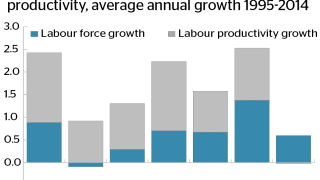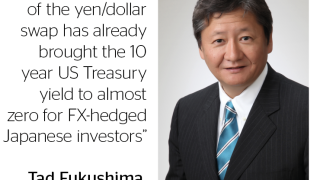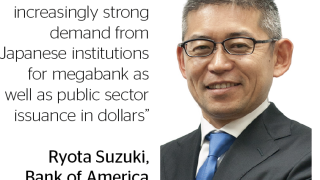Japan
-
In this round-up, The BRICS bank announces its lending target for the next year, two US banks compete for RMB clearing role in New York, and China Construction Bank Tokyo gets admitted to the onshore foreign exchange market. Plus, a recap of our coverage this week.
-
Japanese technology giant SoftBank and the Public Investment Fund of Saudi Arabia have agreed to set up a UK-based technology fund for up to $100bn and have employed former bankers from Deutsche Bank and Goldman Sachs to help with the project.
-
Eisuke Sakakibara, the former Japanese politician who earned the nickname Mr Yen for his aggressive control of the exchange rate, says he is worried that the appreciation of the yen is a sign that the impacts of the expansionary policies known as Abenomics are wearing off
-
Tullett Prebon is set to lose its European chief executive, who becomes the second senior departure in the past week from a planned Tullett-ICAP combined group as the two interdealer brokers look to merge by the end of this year.
-
Given the scale of the task at hand, few should begrudge Prime Minister Abe more time to meet the objectives of his courageous programme to rejuvenate Japan’s moribund economy.
-
In theory, the Bank of Japan’s gargantuan asset buying programme, which forms a central pillar of its quantitative and qualitative easing policy, should transform international capital markets by forcing Japanese investors overseas en masse. But as so often is the case in Japan, theory and practice are very different things.
-
Given the low cost of debt, sluggish domestic growth and poor demographic trends, it is inevitable that international M&A will continue to increase as Japanese corporations’ management looks for growth beyond Japan to boost returns and growth prospects. This is good news for debt markets, which have also been boosted by an increase in the amount of share buy-backs.
-
Despite the problems that negative interest rates bring to a banking sector, Japan’s financial institutions have more to gain from a stronger economic environment than they have to fear from monetary policy. Given the progress they have made in strengthening their capital bases they appear well placed to see out such unhelpful policy, even if it lasts for longer than many hope.
-
Established in 2011 as a means of providing borrowers with easier access to a marginally more restricted investor base than the Samurai market, the Tokyo Pro-Bond market has had mixed fortunes in its five year history. While it has attracted a diverse range of borrowers, overall volumes have perhaps not lived up to expectations. The Tokyo Pro-Bond market has, however, firmly established its credentials as an alternative to the Samurai market, and market participants remain optimistic about its long-term prospects. Participants in the GlobalCapital Pro-Bond roundtable were:
-
Samurai issuance by borrowers from the Asia Pacific region fell from 47% in 2011, when Australian banks accounted for almost a third of issuance, to 16% in 2015. Nevertheless, it is clear that the region will have a key role to play in the evolution of the Samurai market in the years ahead. In the Asia Pacific Issuers Roundtable, borrowers discuss their experience in the Samurai market and look forward to likely developments over the coming few years.
-
It is one of the great ironies in the global capital markets that despite the long history of deep demand for ESG bonds in Japan, Japanese issuers have themselves been reluctant to issue.
-
At the beginning of 2016, the Bank of Japan (BoJ) followed Europe’s central bank and took a dive into the world of negative interest rates. Bond yields have since tumbled and investors and regular borrowers in Japan’s domestic market have been forced to adapt to the new, alien environment. Though Samurai issuance volumes are down in the first half of the year, the world’s second largest bond market is evolving quickly and has proven itself to be both flexible and dynamic. GlobalCapital spoke to seven prominent international yen issuers and two banks about their experiences in the Samurai market this year.












